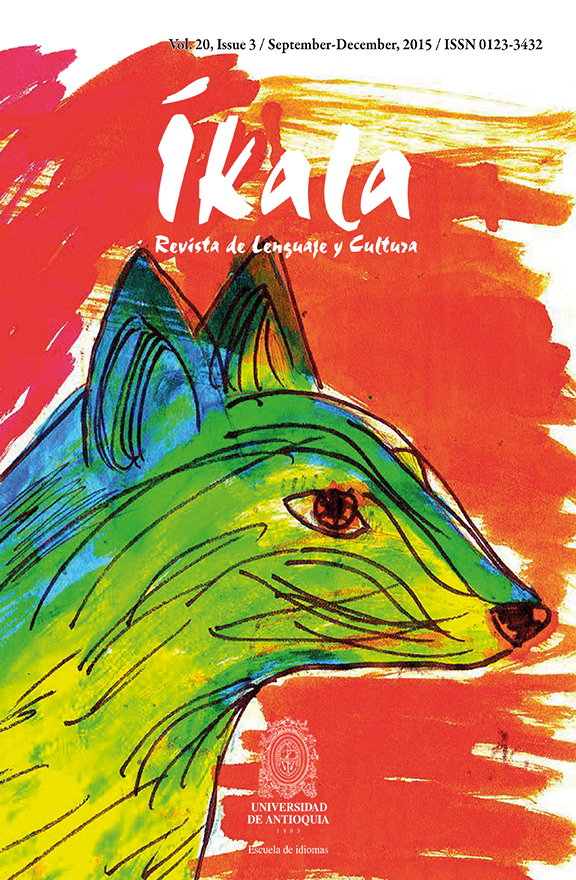Paradoxos da prática: empatia e resistência pela profissão docente
DOI:
https://doi.org/10.17533/udea.ikala.v20n3a04Palavras-chave:
prática docente, afinidade profissional, resistênciaResumo
Este artigo estuda o sentido de afinidade com a profissão docente que um grupo de cinco licenciados em formação manifestaram como resultado da prática pedagógica. O impacto que uma experiência de ensino de quatro meses teve sobre suas expectativas de desenvolvimento profissional constituiu o eixo central deste estudo exploratório. Entrevistas e diários virtuais foram os métodos usados para a coleta dos dados, enquanto a análise do conteúdo foi o enfoque analítico. A maneira em que a prática docente impactou as futuras agendas profissionais dos licenciados em formação sugeriu dois resultados diferentes: empatia e resistência pela profissão docente. Este artigo poderia lançar algumas luzes sobre a conceituação e a compreensão da forma em que se chega a ser docente.
Downloads
Referências
Beijaard, D. (1995). Teachers' prior experiences and actual perceptions of professional identity. Teachers and Teaching, 1(2), 281–294.
Bobeck, B. L. (2002). Teacher Resiliency: A key to career longevity. The Clearing House, 75(4), 202–205.
Brown, S. W. (2005). Emily and Rebecca: A tale of two teachers. Teaching and Teacher Education, 21(6), 637–648.
Clandinin, D. J., Downey, C. A., & Huber, J. (2009). Attending to changing landscapes: Shaping the interwoven identities of teachers and teacher educators. Asia–Pacific Journal of Teacher Education, 37(2), 141–154.
Darling–Hammond, L. (2003). Keeping good teachers: Why it matters, what leaders can do. Educational Leadership, 60(8), 7–13.
Farrell, T. S. (2001). English language teacher socialisation during the practicum. Prospect, 16(1), 46–62.
Inman, D., & Marlow, L. (2004). Teacher retention: Why do beginning teachers remain in the profession?. Education, 124(4), 605–614.
Johnson, S. M., & Birkeland, S. E. (2003).The schools that teachers choose. Educational Leadership, 60(8), 20–24.
Kelly, L. M. (2004). Why induction matters. Journal of Teacher Education, 55, 438–448.
Kondracki, N.L., Wellman, N.S., & Amundson, D.R. (2002). Content analysis: Review of methods and their application in nutrition education. Journal of Nutrition Education and Behaviour, 34(4), 224–230.
Lasky, S. (2005). A socio–cultural approach to understanding teacher identity, agency and professional vulnerability in a context of secondary school reform. Teaching and Teacher Education, 21(8), 899–916.
Nias, J. (1996). Thinking about feeling: the emotions in teaching. Cambridge Journal of Education, 26 (3), 293–306.
Nieto, S. (2003).What keeps teachers going? New York, Teachers College Press.
Peeler, E., & Beverley, J. (2003). Mentoring: Bridging the identity crisis for beginner Teachers.NZARE AARE Conference Auckland.
Ryan, Mary E. & Healy, Annah, H. (2009). It's not all about school: ways of disrupting pre–service teachers' perceptions of pedagogy and communication. Teaching and Teacher Education, 25(3), 424–429.
Wideen, M., Mayer–Smith, J., & Moon, B. (1998). A critical analysis of the research on learning to teach: Making the case for an ecological perspective inquiry. Review of Educational Research, 68(2), 130–178.
Yost, D. (2006). Reflection and self–efficacy: Enhancing the retention of qualified teachers from a teacher education perspective. Teachers Education Quarterly, (Fall), 59–76.
Downloads
Publicado
Como Citar
Edição
Seção
Licença
Copyright (c) 2015 Ikala

Este trabalho está licenciado sob uma licença Creative Commons Attribution-NonCommercial-ShareAlike 4.0 International License.












